Reverend Jeremiah Wright’s powerful speech at the Michigan Roundtable for Diversity and Inclusion’s Equity Action Summit emphasizes the importance of storytelling, community, and recognizing the strength within marginalized communities to achieve genuine social change.
The Power of Story for Reconciliation
Reverend Wright highlights the book “Radical Reconciliation,” detailing how Bishop Desmond Tutu used biblical principles and the power of personal narratives to bring about healing in South Africa [03:22]. He emphasizes that telling our stories can change perceptions and transform society.
Lessons from the African-American Experience
Drawing parallels to the South African experience, Reverend Wright discusses the slave narratives collected by the WPA [08:39] and John Langston Gwaltney’s “Drylongso” [13:51], emphasizing the resilience and strength found in ordinary people. He challenges the concept of “deficit thinking” [19:59], arguing that societal problems stem from a “toxic system” rather than inherent flaws in individuals.
Family, Faith, and Overcoming Adversity
Reverend Wright shares his own family history, highlighting the perseverance and achievements of his grandfathers, father, mother, and uncle. These stories illustrate the power of education, faith, and determination in overcoming adversity [26:17].
Ubuntu: The Importance of Community
Reverend Wright introduces the African concept of “Ubuntu,” emphasizing that “I am because we are, and because we are, I am” [47:18]. He concludes by stressing the interconnectedness of humanity and the power of God’s spirit (“Ntu”) to create a community built on diversity, inclusion, and strength [52:16].
The Power of Story for Reconciliation
Reverend Wright highlights the book “Radical Reconciliation,” detailing how Bishop Desmond Tutu used biblical principles and the power of personal narratives to bring about healing in South Africa [03:22]. He emphasizes that telling our stories can change perceptions and transform society.
Lessons from the African-American Experience
Drawing parallels to the South African experience, Reverend Wright discusses the slave narratives collected by the WPA [08:39] and John Langston Gwaltney’s “Drylongso” [13:51], emphasizing the resilience and strength found in ordinary people. He challenges the concept of “deficit thinking” [19:59], arguing that societal problems stem from a “toxic system” rather than inherent flaws in individuals.
Family, Faith, and Overcoming Adversity
Reverend Wright shares his own family history, highlighting the perseverance and achievements of his grandfathers, father, mother, and uncle. These stories illustrate the power of education, faith, and determination in overcoming adversity [26:17].
Ubuntu: The Importance of Community
Reverend Wright introduces the African concept of “Ubuntu,” emphasizing that “I am because we are, and because we are, I am” [47:18]. He concludes by stressing the interconnectedness of humanity and the power of God’s spirit (“Ntu”) to create a community built on diversity, inclusion, and strength [52:16].

Leave a Reply